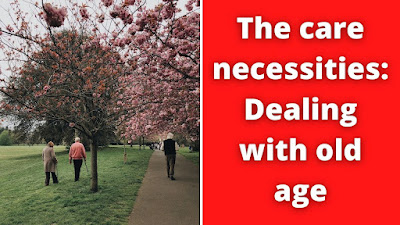[Listen to an audio version of this blog entry here.]
For most of us, although tragically not all, dealing with the death of our parents is as unavoidable as our own death.
 |
| How we care for our elderly is set to become an even greater issue in the years ahead. (Image from Pexels.) |
Same body, different mind
While the actual passing of a mother and/or a father is, I can only imagine at this stage, tough to shoulder, what can be just as difficult is seeing those who reared us deteriorate in health before they breathe their last.This deterioration, of course, is both physical and mental. On the former, it can be quite a shock to see elderly parents after a protracted period of time, noticing how frailer and slower they've become.
Yet, it is mental loss that is arguably more difficult to come to terms with. This is not to make little of physical decline. If assistance is needed for minor everyday tasks — getting in and out of bed, personal hygiene and suchlike — not only is this sad to see but it requires an amount of time-consuming, potentially costly care and logistics.
However, when the mental degeneration is more than just standard senility, it can be harder to cope with and manage. I mean this in terms of actual interaction with the sufferer. And I'm referring to dementia in its various forms.
'The hope is that we can be as active and "with it" as close to our death as possible.'We may understand in theory that there's a disease afflicting the mind of our loved one but seeing it played out for real on a regular basis can be taxing and troubling. It can test our own mental strength, our patience.
By all accounts, it's like interacting with a completely different person, a stranger. Yes, it's the body of the one you knew, you loved, you quarrelled with, but the behaviours and utterances are alien. It can break the strongest of bonds.
So it's not surprising that many families prefer to send a loved one with dementia to a care home, even if this is against the wishes of the sufferer and there are sufficient siblings to "burden share".
While the mental decline is severe, he/she may be in good physical shape. Thus, living with the condition could go on for years.
Describing such a person as a 'burden' might sound heartless but the reality is, in most instances, pretty much that.
On a broader level, caring for our elderly when such care is required is something that is going to increase in scale across the world in the coming decades.
The hope is that we can be as active and "with it" as close to our death as possible.
For me and my peers, we should already be working towards that aim.
Describing such a person as a 'burden' might sound heartless but the reality is, in most instances, pretty much that.
Going down with dignity
Coming up to my 38th birthday, I feel that if this debilitating dementia were to be my lot — it is on the maternal side of my family — I'd like to be able to end my existence as soon as it started becoming problematic and my being offered no positive contribution to society (I am contributing positively right now, aren't I?). Of course, it's one thing saying this now, quite another if and when such a scenario arises.On a broader level, caring for our elderly when such care is required is something that is going to increase in scale across the world in the coming decades.
The hope is that we can be as active and "with it" as close to our death as possible.
For me and my peers, we should already be working towards that aim.
Yes, there are still many unknowns as to the best way to get there, but we have plenty of pointers to at least be on a more beneficial path.
__________________________________________________________
Listen to The Corrigan Cast podcast here.
Facebook: Wrong Way Corrigan — The Blog & IQuiz "The Bogotá Pub Quiz".
__________________________________________________________
Listen to The Corrigan Cast podcast here.
Facebook: Wrong Way Corrigan — The Blog & IQuiz "The Bogotá Pub Quiz".
No comments:
Post a Comment